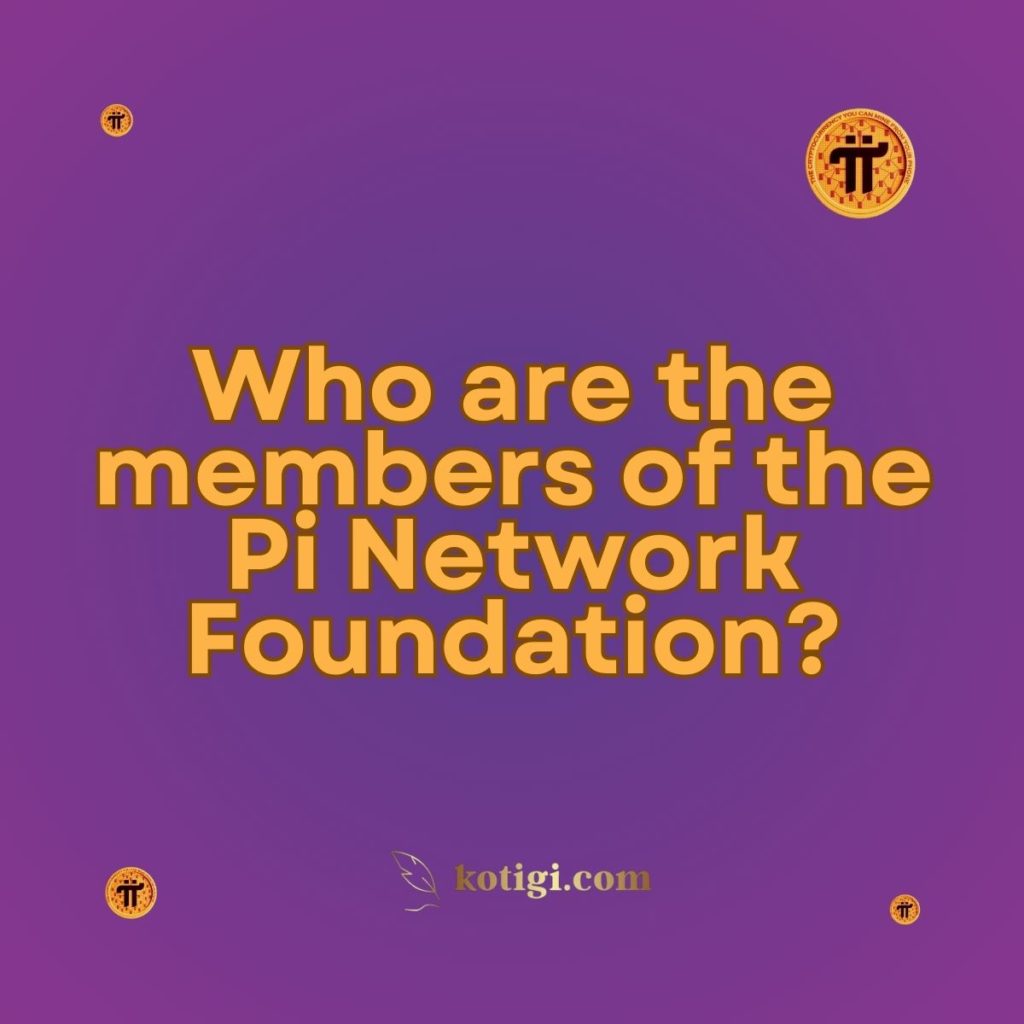
What is Pi Network?
The Pi Network Foundation is composed of a team of experienced leaders, including co-founders Dr. Nicolas Kokkalis and Dr. Chengdiao Fan, both of whom have academic backgrounds in computer science and social computing. The foundation includes a diverse set of experts in blockchain technology, security, and community development who are dedicated to building a decentralized and accessible cryptocurrency ecosystem.
Introduction
The Pi Network Foundation is at the heart of the Pi Network’s development and strategic vision. As the guiding body behind the platform, it drives the technological advancements, partnerships, and community efforts that define Pi’s progress. Understanding who makes up the leadership of the Pi Network Foundation can provide insight into the project’s goals and its potential to shape the future of cryptocurrency.
1. Co-Founders of Pi Network
The foundation of Pi Network rests on the visionary efforts of its co-founders, Dr. Nicolas Kokkalis and Dr. Chengdiao Fan. Both of these individuals have extensive experience in their respective fields, bringing unique perspectives to the project.
1.1 Dr. Nicolas Kokkalis
Dr. Nicolas Kokkalis is a computer scientist with a background in blockchain technology, security, and distributed systems. His previous academic work includes creating scalable, secure systems, making him a key figure in the technical development of Pi Network.
1.2 Dr. Chengdiao Fan
Dr. Chengdiao Fan has a background in social computing and human-computer interaction. Her research has focused on how social dynamics can be enhanced through decentralized systems, making her contributions to Pi Network essential in shaping its user-centric philosophy.
1.3 Leadership Through Innovation
Together, Kokkalis and Fan lead the foundation’s technical and social development, driving Pi’s dual mission of decentralization and community engagement.
2. The Role of the Foundation
The Pi Network Foundation is responsible for much more than just overseeing the day-to-day operations of Pi Network. It plays a critical role in the platform’s long-term strategy and governance.
2.1 Strategic Vision
The foundation is dedicated to creating a truly decentralized, peer-to-peer economy by leveraging blockchain technology. Their focus on mass adoption, easy accessibility, and ensuring that Pi remains environmentally sustainable sets them apart from other cryptocurrency projects.
2.2 Technology Development
The technical development of Pi, including its layered blockchain infrastructure and security protocols, falls under the purview of the Pi Network Foundation. The foundation works to ensure Pi’s platform can handle millions of transactions efficiently.
2.3 Community Building
The foundation places a strong emphasis on fostering an active and engaged community, with the belief that the strength of Pi lies in its people. The team works on initiatives to grow Pi’s user base and keep the community invested in the project.
3. Advisors and Contributors
In addition to the co-founders, the Pi Network Foundation includes a team of advisors and contributors who bring expertise from a variety of fields.
3.1 Blockchain Experts
The foundation works with blockchain experts who provide guidance on developing secure, scalable, and efficient blockchain systems. These experts play a key role in advising on the technical direction of Pi Network.
3.2 Legal and Regulatory Advisors
With the growing importance of regulatory compliance in the cryptocurrency world, the Pi Network Foundation has assembled legal experts to ensure that the platform adheres to relevant global laws. This team is crucial in navigating the ever-evolving regulatory landscape.
3.3 Community Managers
Community engagement is a major part of Pi Network’s success. Community managers within the foundation focus on outreach and education, helping to grow the platform’s user base through effective communication and engagement strategies.
4. Pi Network’s Governance Structure
The governance structure of the Pi Network Foundation is designed to be transparent and community-driven. The foundation aims to decentralize power as the project grows, giving more voice to its community over time.
4.1 Decentralized Decision-Making
Pi Network envisions a future where decision-making is more decentralized, with the community playing an active role in governance. This is aligned with the principles of blockchain, where no central authority controls the system.
4.2 Role of Validators
Pi validators, who are key members of the community, will eventually have a say in network governance. The role of validators is critical in ensuring the security and smooth functioning of Pi’s blockchain.
4.3 Transparency in Leadership
The Pi Network Foundation ensures that its decision-making process is transparent, releasing regular updates on platform developments and seeking community input for major decisions.
5. Future Leadership Goals
As the project scales and moves closer to full decentralization, the leadership of the Pi Network Foundation has ambitious goals for the future.
5.1 Scaling the Network
The foundation’s leadership is working on ensuring Pi’s technology can scale to handle billions of users worldwide. This includes continued work on the infrastructure and partnerships needed to expand Pi’s ecosystem.
5.2 Expanding Partnerships
The foundation is also looking at partnerships with enterprises, governments, and other blockchain projects. These partnerships will help Pi integrate into the broader economy, making it more useful as a medium of exchange and a store of value.
5.3 Governance by the Community
Pi Network’s long-term vision includes transferring more decision-making power to its community, making the platform more decentralized and resilient to centralized control. This is one of the core values of the foundation’s leadership.
6. Challenges and Opportunities
While the Pi Network Foundation has made significant progress, it faces a range of challenges as the project continues to evolve.
6.1 Navigating Regulatory Compliance
One of the biggest challenges for the foundation is ensuring that Pi Network complies with varying legal frameworks across different countries. This involves navigating the complexities of global financial regulations.
6.2 Ensuring Decentralization
While Pi Network is committed to decentralization, achieving this goal while maintaining a secure and scalable system is challenging. The foundation is continuously working to strike a balance between decentralization and efficiency.
6.3 Creating Sustainable Growth
Another challenge is ensuring the long-term sustainability of the project. The foundation’s leadership must work on ensuring that Pi’s growth does not come at the expense of security or scalability.
Conclusion
The Pi Network Foundation is led by a visionary team focused on creating a decentralized and accessible cryptocurrency. Through its leadership in blockchain technology, community building, and strategic partnerships, the foundation is shaping Pi Network into a cryptocurrency with the potential to bring financial inclusion to millions. The co-founders, advisors, and broader community are working together to build a sustainable and scalable ecosystem that could redefine the future of cryptocurrency.
Key Takeaways
- Strong Leadership: Co-founders Dr. Nicolas Kokkalis and Dr. Chengdiao Fan lead the foundation with expertise in blockchain and social computing.
- Community Focus: The foundation emphasizes building a community-driven platform where users have a voice in governance.
- Technical Expertise: Pi Network’s technical development is guided by experts in blockchain technology and decentralized systems.
- Regulatory Compliance: Legal advisors ensure that Pi Network complies with relevant global regulations.
- Future Governance: The foundation plans to decentralize governance over time, empowering its community to make key decisions.
- Challenges: The foundation faces challenges like navigating legal frameworks and ensuring the balance between decentralization and scalability.





